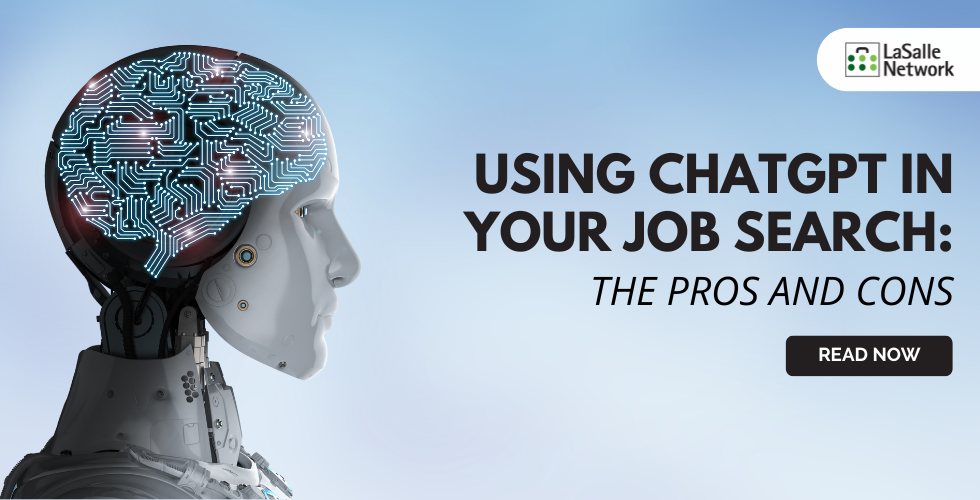A robot that can write a cover letter? Sounds too good to be true. Believe it or not, the latest artificial intelligence (AI) technology taking the world by storm, ChatGPT, can produce unique content specific to your job search. But should you use it?
The short answer? Yes and no. Here’s a comprehensive breakdown of all the pros and cons of using ChatGPT to power your job search.
What is ChatGPT?
Simply put, it’s new AI that functions conversationally to answer questions. Because of its conversational capabilities and ability to use past questions to inform responses, ChatGPT is great at generating creative content, explaining concepts and creating templates.
That means, when it comes to your job search, with the right information ChatGPT can create cover letters, resumes and even offer tips on interviewing or networking.
Putting ChatGPT to the test
We decided to put ChatGPT to the test. We copied one of our job descriptions into ChatGPT and asked the software to “write me a cover letter based on this job.” It generated a four-paragraph cover letter peppered with direct references to the job description.
We then put the cover letter in front of several recruiters and, without cluing them in to the AI author, asked what they thought. The main critique was the lack of specificity. While the cover letter was specific to the job description, there were no details about personal achievements that might qualify a candidate for the job.
We took their feedback into consideration, and this time asked ChatGPT to “write a cover letter based on my resume and this job description,” then pasted in a resume alongside the job description.
While the cover letter became more specific, citing actual experiences and skills from the resume, there was a lack of connection between the resume and the job description. Rather than providing insight on how past experiences equipped the candidate for the job and fulfilled requirements, ChatGPT kept experience and job requirements in isolation.
The cover letter also had some awkward phrasing at times, due to ChatGPT’s tendency to pull phrases verbatim from the referenced documents. For example, it pulled the phrase “ad-hoc projects as assigned” and wrote, “I am also confident in my ability to assist with ad-hoc projects as assigned,” an unusual thing to highlight in a cover letter.
How can it be used to my advantage?
Though the cover letters that ChatGPT generated were not particularly specific, they pulled out the main themes of the job description and identified important requirements. The cover letter was a great template to build on and could also be used as a benchmark to compare current cover letters to.
This same strength can be leveraged for other aspects of job searching.
Use ChatGPT to prepare for interview questions. It can provide top questions to prepare for, as well as insightful answers for even highly specific questions. However, just rattling off an answer that doesn’t point back to you does nothing. Again, ChatGPT’s answer can be used as a foundation, template or starting point for crafting strong narratives to questions. Incorporate personal experience and quantifiable metrics of success into your response, something AI can’t tell you.
ChatGPT can also be utilized to optimize a LinkedIn profile. Inputting your resume into the software, then asking it to “write a professional summary using my resume” can create a great summary to add to the “About” section on LinkedIn. Again, use the product as a foundation or point of comparison, and take time to tweak it and add personal touches.
ChatGPT can also provide helpful information on potential future employers. From learning about the company’s history to digging into leaders’ profiles, the software can offer insight that may be harder to uncover on the company’s website or LinkedIn. Note that ChatGPT only has reliable information from 2021 and previous, so it may not be able to provide substantial data on newer companies.
If you’re not sure where to start, ChatGPT can even be used to help generate potential industries or positions to look into. Simply input interests and skills into the chat and ask ChatGPT what jobs to apply to. For example, the prompt, “If I enjoy writing and nonprofit work, what jobs should I apply to?” produced a list of five relevant job titles to consider.
Is it worth it?
When it comes to creating content, like a cover letter or resume, ChatGPT learns from past interactions, so continuing to specify requests will lead to a better and better product. However, at the end of the day, guiding the AI may take longer than just writing a cover letter or resume yourself.
While ChatGPT can be leveraged as a resource, it cannot replace human connection. You know yourself better than AI ever will, and human qualities—forming relationships, empathizing, telling stories—all play into the job search just as much as the technical elements.
If you’re job searching, LaSalle Network is here to help! Search our open jobs and get connected with a recruiter here.





